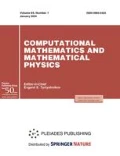Abstract
The problem of recognition (classification) by precedents is considered. Issues of improving the recognition ability and the training rate of logical correctors, i.e., the recognition procedures based on the construction of correct sets of elementary classifiers, are studied. The concept of a correct set of generic elementary classifiers is introduced and used to construct and investigate a qualitatively new model of the logical corrector. This model uses a wider class of correcting functions than in the earlier constructed models of logical correctors.
Similar content being viewed by others
References
L. V. Baskakova and Yu. I. Zhuravlev, “A model of recognition algorithms with representative sets and systems of support sets,” Zh. Vychisl. Mat. Mat. Fiz. 21, 1264–1275 (1981).
Yu. I. Zhuravlev, “Recognition algorithms with representative sets (logic algorithms),” Comput. Math. Math. Phys. 42, 1372–1382 (2002).
A. I. Dmitriev, Yu. I. Zhuravlev, and F. P. Krendelev, “On a principle for the classification and prediction of geological objects and phenomena,” Izv. Sib. Otd. Akad. Nauk SSSR, Ser. Geol. Geophys. 5, 50–64 (1968).
E. V. Dyukova and N. V. Peskov, “Search for informative fragments in descriptions of objects in discrete recognition procedures,” Comput. Math. Math. Phys. 42, 711–723 (2002).
E. V. Djukova, Yu. I. Zhuravlev, N. V. Peskov, and A. A. Sakharov, “Processing real-valued data using logical recognition procedures,” Iskusstv. Intell., Nats. Akad. Nauk Ukr., No. 2, 80–85 (2004).
Yu. I. Zhuravlev, “Correct algorithms over sets of incorrect (heuristic) algorithms: Part I,” Kibernetika, 13 (4), 5–17 (1977).
K. V. Vorontsov, “Optimization methods for linear and monotone correction in the algebraic approach to the recognition problem,” Comput. Math. Math. Phys. 40, 159–169 (2000).
E. V. Djukova, Yu. I. Zhuravlev, and K. V. Rudakov, “On the logical algebraic synthesis of correct recognition procedures based on elementary algorithms,” Zh. Vychisl. Mat. Mat. Fiz. 36 (8), 215–223 (1996).
E. V. Djukova, Yu. I. Zhuravlev, and M. R. Sotnezov, “Construction of an ensemble of logical correctors on the basis of elementary classifiers,” Pattern Recognit. Image Anal. 21, 599–605 (2011).
E. V. Djukova and P. A. Prokofjev, “Models of recognition procedures with logical correctors,” Pattern Recognit. Image Anal. 23, 184–193 (2013).
E. V. Djukova, M. M. Lyubimtseva, and P. A. Prokofjev, “On logical-algebraic correction in the problem of recognition by precedents,” Mash. Obuchen. Anal. Dannykh 1 (6), 705–713 (2013). http://jmlda.org/en
M. M. Lyubimtseva, “Logical correctors in recognition problems,” in Abstracts of the Best Theses of the Faculty of Computational Mathematic and Cybernetics, Moscow State University, 2014 (MAKS PRESS, Moscow, 2014), pp. 47–49.
E. V. Djukova, Yu. I. Zhuravlev, and P. A. Prokofjev, “Improving the effectiveness of logical correctors,” Mash. Obuchen. Anal. Dannykh 1 (11), 1555–1583 (2015). http://jmlda.org/en
R. M. Sotnezov, “Genetic algorithms for problems of logical data analysis in discrete optimization and image recognition,” Pattern Recognit. Image Anal. 19, 469–477 (2009).
R. E. Schapire and Y. Singer, “Improved boosting using confidence-rated predictions,” Machine Learning 37 (3), 297–336 (1999).
K. V. Vorontsov, “The task-oriented optimization of bases in recognition problems,” Comput. Math. Math. Phys. 38, 838–848 (1998).
E. V. Djukova, “Asymptotically optimal test algorithms in recognition problems,” Probl. Kibern., issue 39, (Nauka, Moscow, 1982), 165–199.
R. D. Carr, S. Doddi, G. Konjevod, and M. V. Marathe, “On the red-blue set cover problem,” in Proc. of the 11th Annual ACM-SIAM Symp. on Discrete Algorithms, San Francisco, 2000, pp. 345–353.
P. Miettinen, “On the positive–negative partial set cover problem,” Inf. Proc. Lett. 108, 219–221 (2008).
D. Peleg, “Approximation algorithms for the label-cover max and red-blue set cover problems,” J. Discr. Alg. 5 (1), 55–64 (2007).
E. V. Djukova and P. A. Prokofjev, “Designing new asymptotically optimal dualization algorithms,” Mash. Obuchen. Anal. Dannykh 1 (8), 1048–1067 (2014). http://jmlda.org/en
Author information
Authors and Affiliations
Corresponding author
Additional information
Original Russian Text © E.V. Djukova, Yu.I. Zhuravlev, P.A. Prokofjev, 2017, published in Zhurnal Vychislitel’noi Matematiki i Matematicheskoi Fiziki, 2017, Vol. 57, No. 11, pp. 1906–1927.
Rights and permissions
About this article
Cite this article
Djukova, E.V., Zhuravlev, Y.I. & Prokofjev, P.A. Logical correctors in the problem of classification by precedents. Comput. Math. and Math. Phys. 57, 1866–1886 (2017). https://doi.org/10.1134/S0965542517110057
Received:
Published:
Issue Date:
DOI: https://doi.org/10.1134/S0965542517110057


